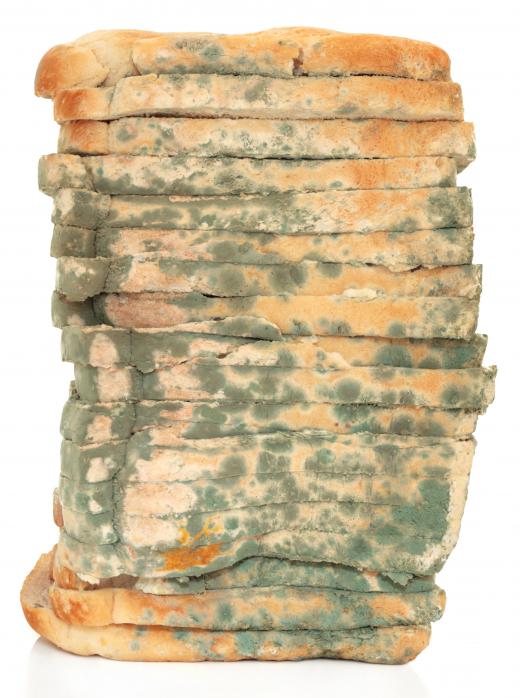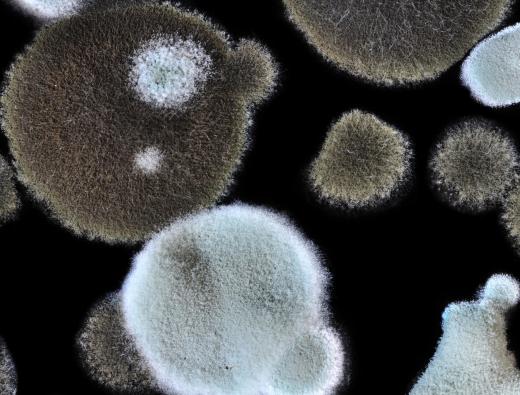What is Aspergillus?
 Mary McMahon
Mary McMahon
Aspergillus is a fungal genus which contains a known 20 species. These fungi manifest as molds, and they are very common in the natural environment. In fact, Aspergillus is so common that it is highly probable that you are breathing some spores in at this very moment. These fungi are of medical interest because several species are pathogenic, causing diseases in humans and animals. Disease caused by an infection with Aspergillus is known as aspergillosis. These fungi have been described since the 1700s.
These fungi form colonies in a wide range of colors, depending on the individual species. Some species grow very rapidly, while others are designed to conserve energy, and they may grow slowly, but steadily. Aspergillus species are aerobic, meaning that they need oxygen to survive, and they tend to prefer oxygen-rich environments. They grow on a variety of substrates, from the walls of homes to the leaves of plants.

Some Aspergillus species colonize food, causing spoilage. Others are relatively benign, unless they happen to land in the body of someone who has a vulnerable immune system. Other people are usually able to resist infection as long as they are generally healthy. One of the most common forms of aspergillosis is a lung infection; birds in particular are vulnerable, as are young children and people with existing lung conditions such as asthma. The fungi can colonize the respiratory tract, causing coughing and severe discomfort. Antifungal medications can be used to treat lung infections caused by Aspergillus species, along with supportive therapy to keep the patient's airway clear.

In people with compromised immune systems, it is possible to develop invasive aspergillosis, in which the fungi spread throughout the body. Several antifungal drugs can be used to treat this form of the infection, although invasive aspergillosis can overwhelm a patient's body if he or she is very sick. Cancer patients and people with AIDS are especially at risk of developing this form of aspergillosis, among many other opportunistic infections.

These fungi aren't all bad. A. oryzae is a species used in the fermentation of some traditional foods such as sake, and A. niger may not be a welcome guest when it colonizes the walls of a home, but it can be used to produce a number of medically useful compounds. With the discovery of additional species, scientists will undoubtedly discover more members of the Aspergillus genus with practical and beneficial uses.
AS FEATURED ON:
AS FEATURED ON:


















Discussion Comments
I was diagnosed with it as a nail infection in nails on several toes and OTC products or RX for bail infections do not work to kill it. I either have to remove the nail or use cream every night indefinitely.
Aspergillus is the source of a variety of digestive enzymes that are used commercially in products to facilitate the digestion of proteins. And these enzymes have the added benefit of reducing post-surgical inflammation.
@burcidi-- I don't know if it's the same for everyone, but my brother had symptoms of short breath and a swollen throat. He complained of difficulty breathing and that it felt like his stomach and chest area was swollen.
He was diagnosed with aspergillosis after a blood test and chest x-ray.
@burcidi-- I know what you're going through, I had the same problem several years ago. Mold fungi can be very difficult to get rid of, especially when the temperature and moisture levels are perfect for it.
If possible, try to turn off any heat in the basement and don't use it for a while. Aspergillus also likes to grow in the foam in mattresses and couches. So you might have to get your furniture, beds, carpets out of the basement to treat it and kill the mold.
At one point I was even suspecting my plants. I heard that aspergillus can grow in the soil of house plants, especially if it's in a warm spot.
I think you should make a checklist of everything in the house or basement that aspergillus might be growing in and take some action to kill it. Taking away the heat and moisture should be the first step.
How do we know if we have an aspergillus infection or not?
I'm allergic to mold and have been trying to rid my basement of mold for a long time. It's tough! They're very stubborn and meanwhile my allergies seem to be getting worse. I cough constantly when I go near the basement and sometimes even when I'm upstairs.
We haven't confirmed which species the mold is yet but it might be aspergillus. I'm very frightened to hear about the health problems it could cause. I'm on allergy medication right now and just had a doctor visit recently. I don't think I have an infection but what are some symptoms I should watch out for in case it happens?
I already cough due to allergies, so it would be hard for me to know if that's a symptom or not.
Post your comments